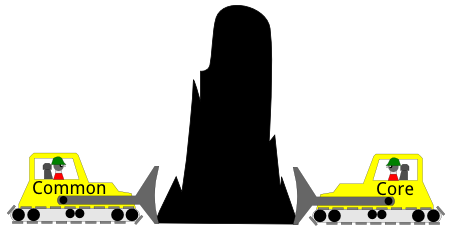The Common Core State Standards may have unintended consequences.
As a ground floor upon which to build a rich education, some kind of “basics” are a good thing. However, much can go wrong during the implementation of nationwide education standards. People will be held accountable on the basis of tests. That is not good. Tests are a weak point in the education process. Tests are the tools used to generate grades. Grades tell students “you’re done” more than any other thing. Work till you get a grade, then stop.
Worse than that is the destruction of diversity. Through the common core, we are dismantling the strength and resilience of our culture.
I’m unique. I am also similar to many other people. Similar, yes. Duplicate, no.

The famous bell curve is not a prescriptive thing. It is derived by observation from the range of any normal population for a given measurement. The bell curve does not tell us who will be a the middle nor who will be at either extreme. It tells us that variety is NORMAL.
The common core does not appear to value the diversity of a natural population. The common core seems to imply that bulldozing the ends toward the middle is in our best interest educationally.

Monoculture is a good term to apply in the discussion of the Common Core State Standards. Monoculture is most often applied to agriculture, where one crop dominates a field or even all the fields of a region. If your goal is to grow corn with the highest possible yield, it makes a kind of sense to plant a strong variety of corn across a wide area.

Image Credit: jpellgen via Flickr (cc-by-nc-nd)
The problem of applying aggressive monoculture in agriculture is that natural diversity is harmed. This becomes especially true when the large scale farms use herbicides to knock down any and all competition. In that case, only corn can grow, corn of the specified variety.
The planet Earth has not developed monocultures often, and when they do happen (red tide, algae blooms, locusts, etc.) we recognize them as a bad event. Diversity and cyclic advance and decline of multiple populations is the balance which has been our planet’s nature.
Education cannot be exactly matched with the monoculture model of agriculture, of course. We give some recognition to the idea of individualizing the school experience for each learner. Nonetheless, we need to anticipate the impact of CCSS monoculture on public education.
There is a real chance that students will be “the corn” in this analogy. They will miss the natural opportunities to learn from the variety of perspectives of a diverse corps of professional educators. They may, instead, be exposed to a fixed curriculum delivered in a relatively rote way by inexperienced and uninspired content delivery specialists. As “good corn”, the students graduate into a world where they hope “good corn” is the desired food for dinner. If not, they will grumble through their adult years becoming the individuals that they couldn’t be in school. Students with difficulty being “good corn” won’t get the chance to try to be “good beans” or “good peaches.” A rich mix of cultures and expectations could let students know what it is like to be good corn, good peas, good peaches, etc. but only if diversity is honored in the school. Humans vary. We need to be judged by more than our ability to be all alike.
Changing schools won’t have much effect, either. If everybody has the same curriculum set into the same timing of scope and sequence, it won’t matter if an individual is quick or slow. A new teacher and a new school will be indistinguishable. Just because the name of the teacher is different will not make any more difference than a different name on the tractor tilling the corn field.
Times change, the environment of Earth flexes from cold to hot and back, wet to dry, and so on. A healthy ecosystem has varieties of plants and animals with the genetic tools needed so that some part of the system survives. Perhaps a strong monoculture of education will succeed, but only if tomorrow is an exact copy of yesterday. We know that change in our future is accelerating not stabilizing.
There’s always something to learn. It helps when you have a guidebook. The guidebook points you in the right direction.
P2PU Webmaking 101 is that kind of guide. I started following the guide a while ago, and have checked back in from time to time. In the meantime, though, there have been things going on, and I’ve been officially not involved.
The Posterous Spaces site is gone, so this blog takes over.
I’ve actually done all the steps for the course, but feel it is only right to go through the stages of the course, here.
This post reintroduces my blogging on the process.
Come and go as you please.
P2PU is part of my recent upgrade process.
Webmaking 101 has been under way for a while for me. Not steady, but behind the scenes, I’ve been working. Occasionally I make comments on somebody’s new blog or try to offer a brief encouraging remark.
I thought I’d created a blog for the Webmaking course some time back, but I cannot find my notes. I *think* it was on Posterous, but now I cannot check. Posterous is no more. Somebody bought it out and has closed it.
I’ve had my own site for a while, but have made very little other use of this blog space which is provided through my Hostway service.
I’m going to use this to be my P2PU connection.